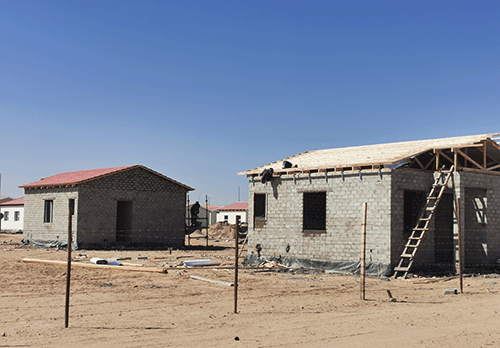Popular Democratic Movement leader McHenry Venaani has once again voiced his concerns regarding government’s response to the housing crisis, stating that it has been inadequate.
He made these remarks during the PDM’s self-styled housing conference held in Windhoek on Wednesday.
“Currently, 89% of Namibians do not qualify for conventional home loans, and cannot access commercial housing,” Venaani said.
To address the unaffordability, he noted that the government has attempted to construct 12 000 new informal homes each year.
However, the task of formalising and upgrading these settlements is of an immense scale, and has proven to be too challenging for the government to tackle effectively. “In Windhoek, the municipality only provides 100 erven of land every year, while there are 5 000 people seeking to buy land. Consequently, houses become extremely expensive due to the high demand and limited land supply. As land prices rise, it becomes increasingly unaffordable for the poor people,” the 45-year-old seasoned lawmaker said.
Alternative
Venaani proposed a potential solution, suggesting that if the City of Windhoek allocates 10 000 plots outside city boundaries, it could help reduce housing costs. He further highlighted the gravity of the housing backlog in Namibia, stating “in the face of Namibia’s 300 000-unit housing backlog, the Ministry of Urban and Rural Development has failed to meet a target of delivering 5 000 homes annually. Windhoek alone has an estimated backlog of 84 000 units.”
Venaani expressed his discontent by comparing the current housing situation to the apartheid era, arguing that housing was better provided to the masses during the era of the repugnant divide-and-rule regime.
“All those houses built during apartheid belonged to the municipality, and even a domestic worker could have a house because they were renting them from the municipality. Now, people are forced to rent garages,” he charged.
He urged the government to take action and provide social housing to address the crisis.
Venaani also pointed out that housing prices in Namibia are now ranked as the second-highest globally, following Dubai.
He questioned the role of banks in exacerbating the housing crisis, given the increasing monthly bond payments due to rising interest rates.
Meanwhile, in her motion which also seeks to address the housing crisis, Landless People’s Movement legislator Utaara Mootu highlighted the broader impact of the crisis on the physical and mental health, economic stability, social cohesion, and community development.
Statistics provided by her revealed the high levels of inequality in Namibia, with most households falling under the average income bracket.
Mootu said the main factor leading to the housing shortage is that demand outstrips supply, exacerbated by a high unemployment rate, rising housing prices, and growing urbanisation, which result in the proliferation of informal settlements.
“Currently, the policy is mirrored to fit the urban more than the rural set-up. For instance, no housing scheme is available to allow rural communities access to build decent houses on credit schemes. Elderly applicants via the Build Together programme are required to apply with a co-applicant, with an income threshold of N$100 – N$3 000. This neo-liberal approach excludes the masses, and lacks the capacity to foster rural transformation,” the LPM firebrand stressed.
Caption:


